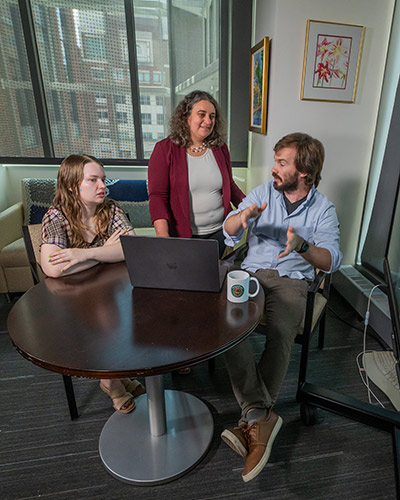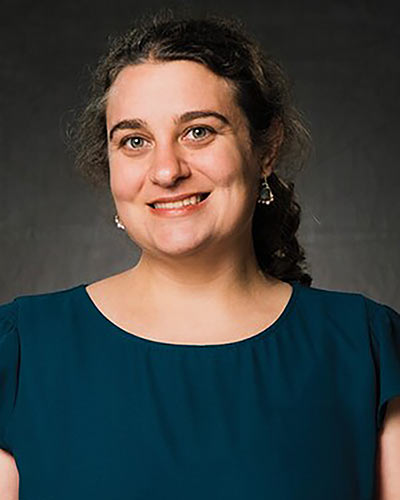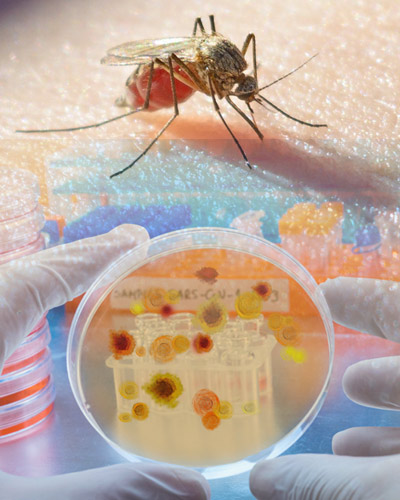February 26, 2020 | Deborah Kotz

UM School of Medicine Scientists Develop Easily Accessible Toolkit That Will Advance Understanding of Role Microbiome Plays in Our Health
University of Maryland School of Medicine’s (UMSOM) Institute for Genome Sciences (IGS) researchers have created the first catalogue of genes that comprise the community of microbes, which inhabit the human vagina. The catalogue, called human vaginal non-redundant gene catalog (VIRGO), was recently released as a public resource that can be used by researchers to facilitate a more in-depth understanding of the role of vaginal microorganisms in women’s health and to potentially develop future treatments for certain gynecologic conditions.
An IGS study describing the development of VIRGO and demonstrating its utility in research was published today in Nature Communications.
“The value of VIRGO is that it functions as both a central repository and a highly scalable tool for fast, accurate characterization of vaginal microbiomes,” said study lead author Bing Ma, PhD, Research Associate in the Department of Microbiology and Immunology at the Institute for Genome Sciences (IGS) at UMSOM. “VIRGO is particularly useful for users with limited computational skills, who want to analyze a large volume of sequencing data and with access to limited computing infrastructure.”
The community of microbes (microbiota) that inhabit the human vagina play critical roles in health and diseases, but current knowledge of the genetic and functional diversity of microbiomes is still limited. Scientists know that optimal vaginal microbiomes are most often dominated by one or more species of Lactobacillus, including Lactobacillus crispatus, L. gasseri and L. jensenii. Research suggests that these beneficial bacteria produce large amounts of lactic acid leading to an acidic environment that protects against harmful infections. Researchers are aiming to learn more, however, about how these bacteria contribute to a woman’s health and disease.
VIRGO could facilitate that goal with close to 1 million genes in the catalogue, each annotated with the name of the bacterium that carries it and with its function, affording a composition and functional characterization of vaginal microbiomes. The researchers estimate that VIRGO contains over 95 percent of all the genes found in vaginal microbiomes. VIRGO is thus comprehensive and the study team showed it is applicable to populations from North America, Africa and Asia. Ultimately, VIRGO and its associated analytical framework will facilitate and standardize the analysis and interpretation of large meta-genomic and meta-transcriptomics datasets. VIRGO and its associated files are freely available for free at this website.
The resource was constructed using a combination of metagenomes sequenced at IGS and urogenital bacterial isolate genomes in part downloaded from public repositories. Sequencing was performed through Maryland Genomics, which is part of the IGS and composed of the Genomic Resource Center (GRC), Informatic Resource Center (IRC) and the Microbiome Service Laboratory (MSL). Innovative analytical strategies were applied to develop VIRGO, leveraging the computational infrastructure and expertise of the IGS Microbiome group.
“VIRGO will facilitate the analysis of data now common to microbiome studies and provide comprehensive insight into microbial membership, function, and ecological perspective of the vaginal microbiome,” said Michael France, PhD, Postdoctoral Fellow at the Institute for Genome Sciences (IGS) at UMSOM, and co-author on the study.
The team demonstrated the power of VIRGO in analyzing over 1,500 vaginal metagenomes. In doing so, the research team discovered that vaginal bacteria are more genetically diverse than originally thought, meaning that women each carry their own personalized version of these bacteria. More importantly, they found that optimal vaginal microbiota dominated by Lactobacillus species are actually made of several strains of the same species. Each strain brings a unique function to the community, and the combination of these strains is what define the strength of the protective properties of the optimal vaginal microbiota.
“This finding is a paradigm changing discovery, as it moves the field away from the idea that a single strain of Lactobacillus is responsible for an optimal microbiome,” said Jacques Ravel, PhD, Professor of Microbiology and Immunology, Associate Director and Senior Scientist at the Institute for Genome Sciences (IGS) at UMSOM.
While the IGS researchers will continue to update and expand VIRGO, they will further their understanding of the role played by the vaginal microbiome in conditions such as bacterial vaginosis, sexually transmitted infections and adverse obstetrics outcomes including preterm birth. Their research is funded by the National Institute of Health (NIH), National Institute for Nursing Research (NINR), National Institute for Allergies and Infectious Diseases (NIAID), and the Bill and Melinda Gates Foundation.
“Important efforts are underway by UMSOM faculty to translate our growing understanding of human-associated microbial communities into clinical biomarkers and treatments,” said UMSOM Dean E. Albert Reece, MD, PhD, MBA, who is also Executive Vice President for Medical Affairs, University of Maryland and the John Z. and Akiko K. Bowers Distinguished Professor. “This groundbreaking research provides powerful, publicly available tools to researchers who are addressing key health issues for women.”
About the University of Maryland School of Medicine
Now in its third century, the University of Maryland School of Medicine was chartered in 1807 as the first public medical school in the United States. It continues today as one of the fastest growing, top-tier biomedical research enterprises in the world -- with 45 academic departments, centers, institutes, and programs; and a faculty of more than 3,000 physicians, scientists, and allied health professionals, including members of the National Academy of Medicine and the National Academy of Sciences, and a distinguished two-time winner of the Albert E. Lasker Award in Medical Research. With an operating budget of more than $1.2 billion, the School of Medicine works closely in partnership with the University of Maryland Medical Center and Medical System to provide research-intensive, academic and clinically based care for nearly 2 million patients each year. The School of Medicine has more than $540 million in extramural funding, with most of its academic departments highly ranked among all medical schools in the nation in research funding. As one of the seven professional schools that make up the University of Maryland, Baltimore campus, the School of Medicine has a total population of nearly 9,000 faculty and staff, including 2,500 student trainees, residents, and fellows. The combined School of Medicine and Medical System (“University of Maryland Medicine”) has an annual budget of nearly $6 billion and an economic impact more than $15 billion on the state and local community. The School of Medicine faculty, which ranks as the 8th highest among public medical schools in research productivity, is an innovator in translational medicine, with 600 active patents and 24 start-up companies. The School of Medicine works locally, nationally, and globally, with research and treatment facilities in 36 countries around the world. Visit medschool.umaryland.edu
About the Institute for Genome Sciences
The Institute for Genome Sciences, founded in 2007, is an international research center within the University of Maryland School of Medicine. Comprised of an interdisciplinary, multidepartment team of investigators, the Institute uses the powerful tools of genomics and bioinformatics to understand genome function in health and disease, to study molecular and cellular networks in a variety of model systems, and to generate data and bioinformatics resources of value to the international scientific community. Visit igs.umaryland.edu
Contact
Office of Public Affairs
655 West Baltimore Street
Bressler Research Building 14-002
Baltimore, Maryland 21201-1559
Contact Media Relations
(410) 706-5260
Deborah Kotz
Director of Media Relations
Office of Public Affairs & Communications
University of Maryland School of Medicine
o: 410-706-4255
c: 410-804-0054
t: @debkotz2
Related stories

Friday, July 25, 2025
New Research Simulates Cancer Cell Behavior
In the same vein as weather forecast models that predict developing storms, researchers now have developed a method to predict the cell activity in tissues over time. The new software combines genomics technologies with computational modeling to predict cell changes in behavior, such as communication between cells that could cause cancer cells to flourish.

Wednesday, November 06, 2024
Genomic Databases Need More Diversity
It is commonly known that most genomic databases are biased toward people with European ancestry. Scientists have warned that leaving out other populations could skew results in areas such as drug development, diagnostic testing, and polygenic risk scores—which looks at many genetic variations in a person’s DNA to predict their disease risk.

Wednesday, August 28, 2024
Leading Computational Scientist and Oncology Researcher Elana Fertig, PhD, Appointed as New Director of the Institute for Genome Sciences at the University of Maryland School of Medicine
University of Maryland School of Medicine (UMSOM) Dean Mark T. Gladwin, MD, announced today the appointment of Elana J. Fertig, PhD, FAIMBE, as the new Director of the School’s Institute for Genome Sciences (IGS). She is an internationally-recognized researcher known for her work in integrating spatial multi-omics technologies with mathematical models to develop a new predictive medicine paradigm in cancer. Spatial technologies allow researchers to learn about any cell type inside of natural tissue, including gene activity and cell interactions.

Wednesday, August 24, 2022
UM School of Medicine Study Finds a New Way to Optimize Treatment Success for Fecal Transplants
Fecal transplants have been successful in treating serious diarrheal infections but have often failed when tried with other diseases. Up until now, no one could predict why these treatments sometimes failed to help restore healthy bacteria in the colon. Researchers from the University of Maryland School of Medicine’s (UMSOM) Institute for Genome Sciences (IGS) have discovered important clues that could lead more personalized approaches to optimize treatment success. They published their findings in Cell Reports Medicine online earlier this month.

Friday, July 29, 2022
Why Breast-Fed Premature Infants Have A Healthier Gut Than Formula-Fed Ones
Human breastmilk has long been considered “liquid gold” among clinicians treating premature infants in a newborn intensive care unit (NICU). Breastmilk-fed “preemies” are healthier, on average, than those fed formula. Why is that true, however, has remained a mystery.

Monday, July 18, 2022
New Genomic Research Shows Why Testing Malaria Vaccines in the Clinic is as Rigorous as Natural Exposure in the Field
Malaria is the deadliest mosquito-borne parasitic infection of humans. In 2021, after a century of research, the World Health Organization (WHO) approved the world’s first malaria vaccine. That vaccine reduces the incidence of malaria infections in young children aged 5-17 months by only 30 percent, meaning that it remains critical to continue developing and testing more effective vaccines.

Thursday, March 18, 2021
UM School of Medicine Helps Maryland Conduct State-Wide Sequencing of Variants in Positive COVID-19 Test Specimens
In an effort to monitor the spread of COVID-19 variants in the State of Maryland, University of Maryland School of Medicine (UMSOM) Dean E. Albert Reece, MD, PhD, MBA, announced that UMaryland Genomics at UMSOM will perform genome sequencing of variants in at least 10 percent of COVID-19 test samples, reaching an important benchmark set by the federal government to help control the spread of these variants.

Thursday, February 25, 2021
UM School of Medicine Researchers Participate in Landmark Study Detailing Sequencing of Full Human Genomes to Better Capture Genetic Diversity
Researchers at the University of Maryland School of Medicine (UMSOM) co-authored a study, published today in the journal Science, that details the sequencing of 64 full human genomes. This reference data includes individuals from around the world and better captures the genetic diversity of the human species. Among other applications, the work will enable population-specific studies on genetic predispositions to human diseases as well as the discovery of more complex forms of genetic variation.

Tuesday, December 03, 2019
UM School of Medicine Researchers Institute for Genome Sciences' Researchers Discover Potential New Treatment for Tropical Parasitic Disease Using Genomics
Using innovative RNA sequencing techniques, researchers at the University of Maryland School of Medicine (UMSOM) Institute for Genome Sciences identified a promising novel treatment for lymphatic filariasis, a disabling parasitic disease that is difficult to treat. The potential new therapy is an experimental cancer drug called JQ1 and targets proteins found prominently in the worm’s genome; it appears to effectively kill the adult worms in a laboratory setting, according to the study which was published today in the journal mSystems.

Wednesday, May 25, 2016
UMSOM Researchers Develop New Way to Decode Large Amounts of Biological Data
A University of Maryland School of Medicine researcher has helped develop an innovative computing technique that, on very large amounts of data, is both faster and more accurate than current methods. To spur research, a program using this technique is being offered for free to the biomedical research community.
